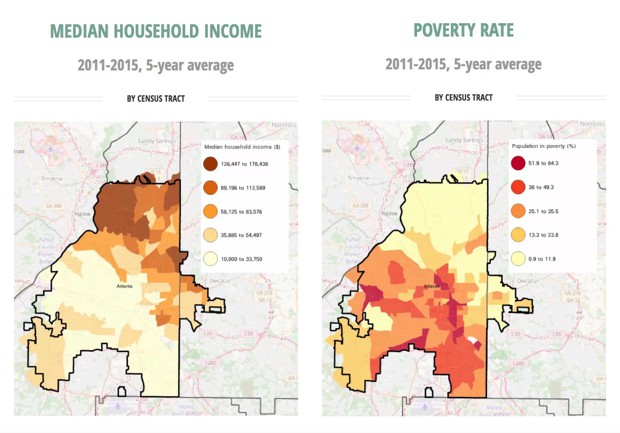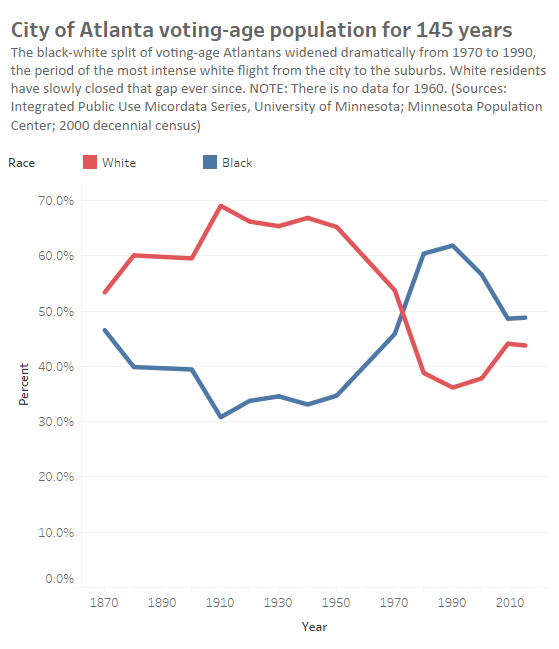
Charles Doyle wears a hat decorated with an image of Atlanta city councilwoman and mayoral candidate Keisha Lance Bottoms as she speaks at an election night party in Atlanta.
The Questionable Imperative for a Black Mayor in Atlanta
The possibility that Atlanta could see its first white mayor in decades has elicited some vocal and prominent resistance. But what is the “Black Mecca” fighting for?
It was important enough for Atlanta to have a black mayor that the Democratic Party pulled out its top black shot callers for the race between city council member Keisha Lance Bottoms, an African American from the party, and city council member Mary Norwood, a white woman who is running as an independent. U.S. Senators Cory Booker, who represents New Jersey, and Kamala Harris, who represents California, both flew into Atlanta in the closing days of the mayoral race to stump for Bottoms.
Neither senator is from the south, which raises the question of what message, exactly, they were there to send. Bottoms has declared victory, although she currently leads Norwood by less than 800 votes. The race has not been officially called yet, but Norwood is contesting the outcome in quite a testy fashion: She’s alleging that some voter intimidation might have occurred. If Norwood were to win, she would be the first white mayor since 1969. The voting map for each candidate shows a city divided: Almost all of the southern precincts, where African-American and low-income households are concentrated went for Bottoms. Meanwhile, most of the precincts in the northern half of the city, where whiter and wealthier households are the norm, went for Norwood.

For a city that seems so evenly split along race and class lines, one has to question whether the mandate for a black mayor is growing obsolete. For those who have rallied behind Bottoms, Atlanta having a black mayor is still an imperative—if for no other reason than perhaps that black mayors are an endangered species these days, as The Wall Street Journal reported this week. But as Kelley Bass Jackson, daughter of Atlanta’s first black mayor Maynard Jackson, told AP’s race reporter Errin Haines Whack, “Atlanta’s identity has been defined by having a black mayor.”
Indeed, Atlanta is known as the “Black Mecca” for having emerged from the Civil Rights era as a magnet for African-American workers and professionals. Maynard Jackson was elected 44 years ago and there has not been a non-black mayor since.
But the black population that made this possible has shrunk considerably, with many African Americans having left the city core for the suburbs. The outward migration is both due to African Americans having done well enough income-wise that they could afford to move out to larger, greener pastures (helped along by an all too generous sub-prime lending industry), and because many are doing bad enough that they can no longer afford to live in the city. The black population has decreased from 61 percent to 50 percent in the last six years alone, while the white population is quickly approaching 40 percent. Those numbers seem to disabuse any idea that Atlanta is still a “Black Mecca.” It also makes the prospect of a white mayor completely plausible.
“There are people who will have you believe that this mayoral battle is fought only along racial lines, but you can’t get within 700 votes of the candidate backed by the black political machine without having black voters—it’s impossible,” said Keith Reed, a former deputy press secretary for Atlanta’s current mayor Kasim Reed. “So the question that has to be asked is why did Norwood have so many black votes if the imperative is for Atlanta to have black leadership?”
Within a week of the runoff election, Norwood had pulled in front of Bottoms in the polls by six points. Norwood also picked up the endorsements of Shirley Franklin, Atlanta’s first black woman mayor, and city council president Ceasar Mitchell, two prominent members of the black political establishment. The 49.5 percent of votes Norwood has pick up so far in Tuesday’s election is well above the percentage of Atlanta’s voting-age population who are white, which is 43.8 percent. There are more than a few precincts in the deepest reaches of the heavily African-American southwest Atlanta neighborhoods where Norwood picked up between 15 and 20 percent of the vote.

This is why a state of emergency was called that summoned Kamala Harris, Cory Booker, and a slew of Atlanta rappers to mobilize black voters. Killer Mike, the rapper who stumped hard for Bernie Sandersin the presidential election, appealed to black Atlanta via Instagram the day before the runoff where he described the threat of a white mayor in terms of gentrification. In his video, he said a black business owner told him:
One day years from now people are going to say that whites gentrified this area, they took everything from us and pushed us out. The truth is, the black people who used to own these businesses died, their children took over these businesses, or didn’t [because] they never saw these businesses as fit for them, they thought there was something better on the other side, so they sold them for cheap. One day they’re going to tell the lie that gentrification ruined Atlanta and they stole everything, and I want you stand up to them and tell them that’s a goddamned lie. The truth is, we gave it away.
The same thing is happening with the mayoral election, said Killer Mike: Black voters are giving the city away to a white mayor. For Mike, Atlanta is the product of decades of hard work by black politicians who made it the sprawling, sparkling destination it is today. Allowing a white mayor to take over would mean squandering all of that work, he argued, and that would be black voters’ fault.
Other observers of the election are claiming that gentrification is, in fact, the reason why Norwood is now so close to the throne. Mike Koblentz, chairman of the Northwest Community Alliance, told AJC.com that black voters were supporting Bottoms possibly “as a check against gentrifying.”
Bruce C. T. Wright wrote in NewsOne.com that “this instance does represent one of the first times we’ve seen gentrification potentially affect a local election to the extent that a decidedly Black political legacy was being threatened.”
The assumption here is that having a black mayor somehow protects black residents from that kind of displacement. In fact, the sweeping demographic changes between black and white residents happened under a black mayor, Kasim Reed.
Norwood names gentrification as a problem she wants to tackle in her platform. She wants to freeze or reduce property taxes in low-income neighborhoods and is willing to “prohibit large-scale development in at-risk neighborhoods” as well. The Atlanta Progressive News outlet, which endorsed Norwood, lists several ordinances that Norwood has sponsored to increase affordable housing in the city, and notes that she supported a “McMansion moratorium” in 2006.
Despite what seem like anti-gentrification credentials, there have been accusations lobbed that Norwood is a stealth Republican candidate, and they appear credible. Appealing to the GOP is not such a bad idea in a southern state like Georgia where conservatives control the governor’s mansion and the legislature. In fact, appealing to the Republican leadership would be a page straight out of the playbook of current mayor Kasim Reed, who enjoys a more than cozy relationship with GOP Governor Nathan Deal. The two came together to help deliver a new Atlanta Falcons stadium to the city, which they hope will revitalize the downtrodden westside. If Bottoms prevails in this race, she most certainly would have to entertain the same partnerships. But no matter the race or party of the candidate, the next mayor will have to deal with the stark income inequalities that exist in the city. The question comes down to who is best suited to address that, and whether race makes a difference in that dynamic.
“When people feel there is an imperative to have a black mayor it’s usually because they are concerned about these disparities,” says Kathryn Rice, founder of Building Quality Communities (BQC), a consultancy specializing in the intersection between economic and community development. “African Americans are also concerned that in the Trump era that a Republican or a white person may not be able to fulfill the promise to address those disparities.”
If Norwood jumps ahead of Bottoms in the recount and wins the race, many will blame gentrification. Will that be a “goddamned lie,” as Killer Mike’s business-owner friend said, and if so, who then will be blamed for giving the city away? Atlanta residents have been voting along racial lines for decades, but as William Boone, a political scientist at Clark Atlanta University told AJC.com, “the importance of voting along racial lines is shifting.”
(Note: And if you don't have a subscription to WSJ, believe me when I tell you that comment section concerning the article on shifting mayoral racial demographics was lit.)
